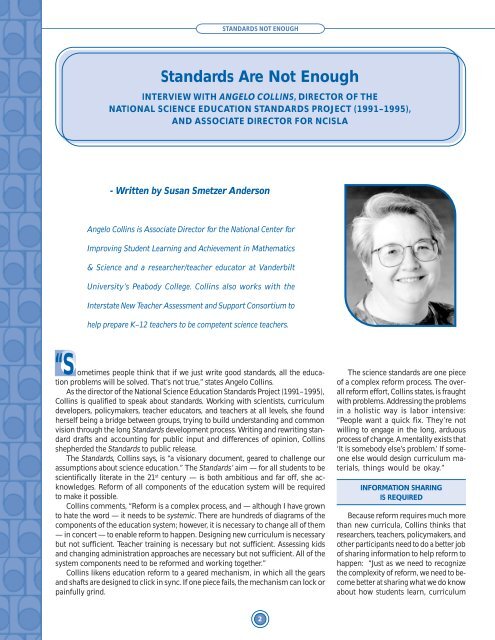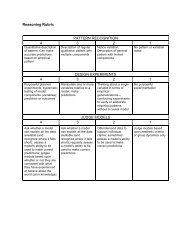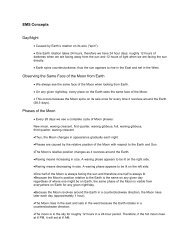Science Education Reform - National Center for Improving Student ...
Science Education Reform - National Center for Improving Student ...
Science Education Reform - National Center for Improving Student ...
Create successful ePaper yourself
Turn your PDF publications into a flip-book with our unique Google optimized e-Paper software.
STANDARDS NOT ENOUGH<br />
Standards Are Not Enough<br />
INTERVIEW WITH ANGELO COLLINS, DIRECTOR OF THE<br />
NATIONAL SCIENCE EDUCATION STANDARDS PROJECT (1991–1995),<br />
AND ASSOCIATE DIRECTOR FOR NCISLA<br />
- Written by Susan Smetzer Anderson<br />
Angelo Collins is Associate Director <strong>for</strong> the <strong>National</strong> <strong>Center</strong> <strong>for</strong><br />
<strong>Improving</strong> <strong>Student</strong> Learning and Achievement in Mathematics<br />
& <strong>Science</strong> and a researcher/teacher educator at Vanderbilt<br />
University’s Peabody College. Collins also works with the<br />
Interstate New Teacher Assessment and Support Consortium to<br />
help prepare K–12 teachers to be competent science teachers.<br />
“S<br />
ometimes people think that if we just write good standards, all the education<br />
problems will be solved. That’s not true,” states Angelo Collins.<br />
As the director of the <strong>National</strong> <strong>Science</strong> <strong>Education</strong> Standards Project (1991–1995),<br />
Collins is qualified to speak about standards. Working with scientists, curriculum<br />
developers, policymakers, teacher educators, and teachers at all levels, she found<br />
herself being a bridge between groups, trying to build understanding and common<br />
vision through the long Standards development process. Writing and rewriting standard<br />
drafts and accounting <strong>for</strong> public input and differences of opinion, Collins<br />
shepherded the Standards to public release.<br />
The Standards, Collins says, is “a visionary document, geared to challenge our<br />
assumptions about science education.” The Standards’ aim — <strong>for</strong> all students to be<br />
scientifically literate in the 21 st century — is both ambitious and far off, she acknowledges.<br />
<strong>Re<strong>for</strong>m</strong> of all components of the education system will be required<br />
to make it possible.<br />
Collins comments, “<strong>Re<strong>for</strong>m</strong> is a complex process, and — although I have grown<br />
to hate the word — it needs to be systemic. There are hundreds of diagrams of the<br />
components of the education system; however, it is necessary to change all of them<br />
— in concert — to enable re<strong>for</strong>m to happen. Designing new curriculum is necessary<br />
but not sufficient. Teacher training is necessary but not sufficient. Assessing kids<br />
and changing administration approaches are necessary but not sufficient. All of the<br />
system components need to be re<strong>for</strong>med and working together.”<br />
Collins likens education re<strong>for</strong>m to a geared mechanism, in which all the gears<br />
and shafts are designed to click in sync. If one piece fails, the mechanism can lock or<br />
painfully grind.<br />
The science standards are one piece<br />
of a complex re<strong>for</strong>m process. The overall<br />
re<strong>for</strong>m ef<strong>for</strong>t, Collins states, is fraught<br />
with problems. Addressing the problems<br />
in a holistic way is labor intensive:<br />
“People want a quick fix. They’re not<br />
willing to engage in the long, arduous<br />
process of change. A mentality exists that<br />
‘It is somebody else’s problem.’ If someone<br />
else would design curriculum materials,<br />
things would be okay.”<br />
INFORMATION SHARING<br />
IS REQUIRED<br />
Because re<strong>for</strong>m requires much more<br />
than new curricula, Collins thinks that<br />
researchers, teachers, policymakers, and<br />
other participants need to do a better job<br />
of sharing in<strong>for</strong>mation to help re<strong>for</strong>m to<br />
happen: “Just as we need to recognize<br />
the complexity of re<strong>for</strong>m, we need to become<br />
better at sharing what we do know<br />
about how students learn, curriculum<br />
2





